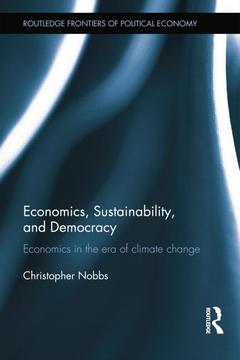Economics, Sustainability, and Democracy Economics in the Era of Climate Change Routledge Frontiers of Political Economy Series

How should we conduct economics in an era of climate change, natural resource depletion and population increase? These issues are systemic, and involve great uncertainties and long time horizons. This book contends that the free-market economics that has dominated capitalist democracies in recent decades is not up to the task; that the welfarist economics that preceded it, while preferable, also has inadequacies; and that what is required is an economics founded on ecological principles, greater respect for the laws of natural science, and a moral commitment to a sustainable future.
The book commences with an exposition of major aspects of orthodox macroeconomic and microeconomic theory. It then explores the bounds of orthodox theory in relation to ethics, liberalism, ideology, society, the international economy, globalization, and the environment, and seeks lessons for a future economics. Issues raised by natural resource use and climate change are given particular prominence. Many of the issues of critical importance in coming decades involve not private goods but public goods: goods which markets are ill-equipped to deal with. In the resolution of these issues political processes will need to be engaged. The availability to each individual of clean air, clean water and adequate sustenance, goods which cannot be provided for by economic production alone, are of central concern.
While acknowledging the importance of market processes, the author argues in favour of a more deliberative and democratic economy, the greater engagement of civil society, environmental human rights and responsibilities, and in favour of a World Environment Organization, change in the conduct of the World Trade Organization, and for economists to accept moral responsibility for the policies they advocate. Specific case studies are given and potential policies outlined.
This book will be of interest not only to economists but also to citizens generally and students concerned with public affairs.
Overture: The Fall PART I 1. Narrative on the History of Macroeconomics 2. Microeconomics and the Economics of Welfare PART II 3. Economics and Ethics 4. Economics and the Liberal Context 5. Economics and Ideology PART III 6. Economy in Society 7. International Economy and Globalization 8. Economy in the Physical World 9. Economics and Climate Change PART IV 10. Economics from a Deontological Perspective 11. Democracy, Citizenship 12. Economics: A Prospective View 13. Mathematical Appendix
Christopher Nobbs has enjoyed a diverse career, including posts as a researcher in molecular biology at the University of Cambridge, as a consultant and administrator at the OECD Environment Directorate, as economist to the Government of Victoria’s salinity control programme, and as co-director of an Australia-wide social research consultancy. His abiding professional interest has been in issues at the intersection of science, economics, and politics, particularly as they relate to the environment. He is a graduate of the Universities of Auckland, London and Cambridge.
Date de parution : 05-2014
15.6x23.4 cm
Date de parution : 07-2012
Ouvrage de 240 p.
15.6x23.4 cm
Mots-clés :
welfarism; financial crisis; scarcity; deontology; population; demographics; environmental economics; public goods; heterodox economics; natural resources; resource economics; natural science; sociology; ethics; philosophy; political science; ecological economics; climate change; democracy; sustainability; sustainable development; economics; nobbs; Young Man; Human Development Indices; NGO Presence; Tamil Nadu; Mauna Loa Volcano; Asset Backing; Federal Reserve; NCM; Vice Versa; International Monetary Fund; Earth’s Protective Ozone Layer; Atlas Economic Research Foundation; Short Run Phillips Curve; Collateralized Mortgage Obligations; ECE; Critical Natural Capital; SPS Agreement; EC Proposal; ECE Region; Direct Democracies; Anthropogenic Enhancement; Deliberative Democracy; WEO; Man Made Capital; BAU Scenario



